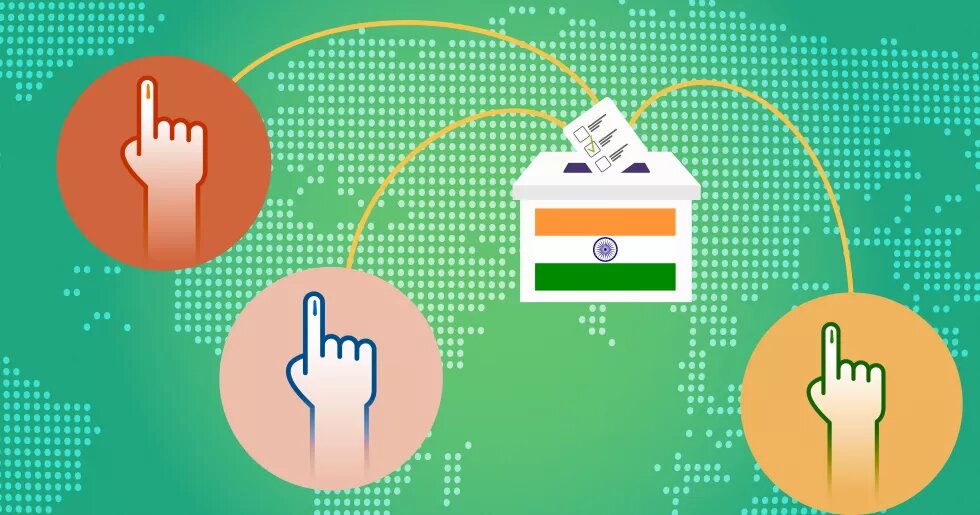This article explores the role of the Indian diaspora in India's elections, as they mobilize support for political parties and advocate for greater representation.

Earlier this month, over 20 cities in the United States saw car rallies expressing support for a potential third term for Prime Minister Narendra Modi and urging diaspora Indians to travel to India and cast their vote in the ongoing 2024 general elections. Garnering massive turnouts, these rallies mark the culmination of three decades of wooing of the diaspora by the ruling Bharatiya Janata Party (BJP). In turn, the diaspora has been a crucial source of influence and support for the Modi-led BJP over the last 10 years.
Globally, the Indian diaspora has two major components: non-resident Indians (NRIs), who still retain their Indian passports, and persons of Indian origin (PIOs), who opted for foreign citizenship post migration. The strength of the Indian diaspora is estimated at 32 million, of whom 18 million are NRIs. It is this latter group as well as those PIOs who maintain family and community links back home that influence the general elections in India. Together, they constitute what is known as the New Indian Diaspora (NID), the largest diasporic community in the world. In 2023, this group sent an astounding US$125 billion in remittances to their families in India, the highest in the world for any country.
In their host countries, the NID are in top economic and professional positions, except in the Persian Gulf region, where only about 35 percent are in the professional category and the rest in low-skilled jobs. The NID also occupy top leadership positions in global corporations such as Microsoft and Google. Their average annual household income in the US is more than double that of the white population. Indians constitute 14 percent of all postgraduate enrollment in the US, and more than 75 percent of the NID in the country have graduate degrees, despite constituting only 1.3 percent of the local population. In countries like Britain and Ireland, members of the Indian diaspora are in high-ranking government positions. These affluent NID play an active role in the politics of both their host and home countries.
Leveraging the clout of the Indian diaspora
Numerically, the NID are insignificant in terms of voting strength. India currently grants voting rights only to NRIs, who have to register well in advance of the elections and be physically present at their respective polling booths to cast their votes on election day. This year, the total number of such registered voters is estimated at 120,000, and the real turnout may be much lower.1 In contrast, the 500 electoral constituencies going to polls comprise over 15-18 million voters. Yet, both the BJP and the Congress, India’s two major national parties, have courted the diaspora in the hope that their financial clout and technological and professional prowess would fuel their election campaigns.
Both parties have diaspora units — Overseas Friends of BJP and the Indian Overseas Congress — and dedicated mechanisms to garner NID support. Especially during Modi’s two consecutive terms, diaspora outreach and the NID’s role in funding and running campaigns, and enhancing the image of party leaders abroad for the consumption of the Indian public have intensified. Diaspora engagement is a major agenda for senior party leaders on overseas visits and diaspora issues are included in party manifestos. In turn, the diaspora supplies funds and sends volunteers to run election campaigns. However, in the absence of transparency in political funding, it is difficult to estimate the quantum of diaspora funds the two parties receive. Notably, the role of the diaspora is not confined only to national politics but also extends to regional parties in southern India, Punjab and Gujarat, who leverage their own diaspora networks during elections.
In the race to rope in the diaspora for the 2024 elections, the BJP has been far more effective than the Congress and other regional parties. The BJP’s success can be attributed to the aggressive and systematic NID outreach by PM Modi in his last 10 years in power. If events at the Madison Square Garden, London and Sydney and the temple inauguration at Abu Dhabi are anything to go by, diaspora mobilisation is Modi’s prime agenda during his foreign visits. He has been able to mobilise large crowds at these events, which have, in turn, built his image as the celebrated Indian leader who has promoted brand India globally, befriended major world powers and catapulted India as a prominent member of the world community. BJP’s cultural nationalism, which has transnational appeal, has been a major driver of the support the party has garnered from major sections of the Indian diaspora.
While the Congress party and its leader Rahul Gandhi have sought to engage the diaspora in similar ways, they have been far less effective. Gandhi’s criticism of Modi’s social policies and autocratic rule does not sit well with the NID, who see rising and globalising India under Modi as an emerging world power. Their own identities and the respect they receive in their host countries are also tied to the prestige that India commands in the world community. That said, the NID is not a monolithic community. Support for the BJP among this group tracks the regional patterns in the party’s domestic voter base, in that a larger segment of the Indian diaspora from southern India does not respond to the BJP in the same way as those with origins in North India.
What’s in it for the diaspora?
India's U-turn on diaspora engagement since the mid-1990s not only serves the interests of the country and its political parties during elections but may also benefit the NID themselves. The diaspora have increasingly and openly voiced their expectations and demands from Indian political establishments. Globally, diaspora communities have engaged with their respective home governments to acquire representation in parliamentary chambers (as in Italy) as well as government and ministerial positions. More than 87 countries now offer multiple citizenship, including for their diasporas. In the same vein, the NID, through bodies such as the Global Organization of People of Indian Origin (GOPIO), are lobbying for participation in India’s political process as well as its governance, administrative and professional landscape. In particular, the NID are demanding nominations in the two houses of Parliament, the Lok Sabha and the Rajya Sabha. However, India is yet to provide such representation, facilities and positions to its diaspora. The Overseas Citizenship of India (OCI) card does not grant dual citizenship, but rather is a long-term visa and permit to do business and avail some facilities in the country.
This year, the NID’s impact on the outcome of the general elections will be marginal, even for the BJP, but their role will likely evolve in the coming years even as the group faces major challenges. Firstly, the increasing financial and technological power of the diaspora can disproportionately impact electoral outcomes. However, with the Foreign Contribution (Regulation) Act, 2010 prohibiting politicians and political organisations from receiving foreign funds, political parties may inhibit the role of the NID or severely regulate it in politics. Secondly, with their role in the farmers’ agitations and secessionist activities already raising concerns in India, the diaspora can also become a liability. Finally, the NID’s engagement with Indian politics and elections will not only reify mainstream divisions but also create and accentuate divisions among themselves. In host countries where the NID intend to create a united Indian diaspora, new Indian migrants will also need to align themselves with such existing divisions.
Disclaimer:
This article was prepared with the support of the Heinrich Böll Stiftung. The views and analysis contained in the publication are those of the author and do not necessarily represent the views of the foundation. Heinrich Böll Stiftung will be excluded from any liability claims against copyright breaches, graphics, photographs/images, sound document and texts used in this publication. The author is solely responsible for the correctness, completeness and for the quality of information provided.


